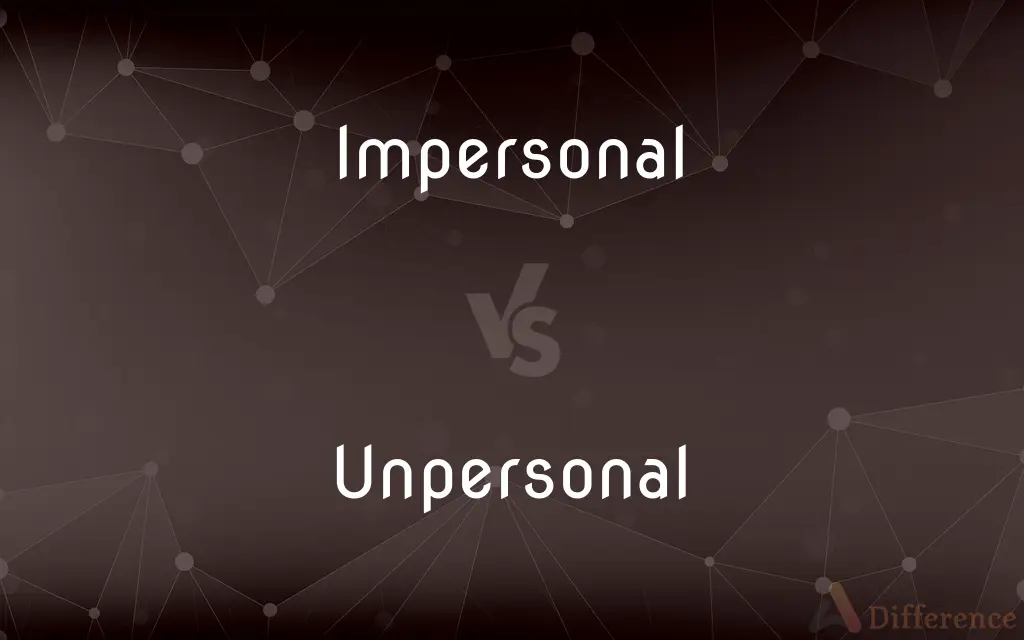Impersonal vs. Unpersonal — Which is Correct Spelling?
By Tayyaba Rehman — Updated on March 19, 2024
Correct spelling is Impersonal, while incorrect spelling is Unpersonal. Impersonal means lacking personal elements or not involving personal feelings.

Table of Contents
Which is correct: Impersonal or Unpersonal
How to spell Impersonal?

Impersonal
Correct Spelling

Unpersonal
Incorrect Spelling
ADVERTISEMENT
Key Differences
"Impersonal" begins with 'im-', a common prefix for negation, as in "impossible."
"Un-" is a prefix often used for reversals, but "impersonal" is not reversible—it's a state.
The word "personal" is complete within "impersonal," hinting that nothing personal is added.
To differentiate "impersonal" from "unpersonal," recall that "impersonal" shares "person" within it, referring to the absence of personal qualities.
"Impersonal" has the same 'im-' as "impartial," both conveying neutrality.
ADVERTISEMENT
How Do You Spell Unpersonal Correctly?
Incorrect: The email felt very unpersonal and formal.
Correct: The email felt very impersonal and formal.
Incorrect: He gave me an unpersonal response to my question.
Correct: He gave me an impersonal response to my question.
Incorrect: The letter was written in an unpersonal manner, lacking any warmth.
Correct: The letter was written in an impersonal manner, lacking any warmth.
Incorrect: I don't like her unpersonal approach to teaching.
Correct: I don't like her impersonal approach to teaching.
Impersonal Definitions
Not personal; not representing a person.
The letter was written in an impersonal tone.
Without reference to any individual.
The rules were applied in an impersonal manner to everyone.
Unbiased, objective; devoid of human character or personal qualities.
Impersonal analysis is crucial for scientific research.
Lacking human warmth or individuality; not influenced by personal feelings.
The modern architecture of the building felt cold and impersonal.
Not engaging with the personal aspects of someone.
He kept the interview strictly professional and impersonal.
Lacking personality; not being a person
An impersonal force.
Showing no emotion or personality
An aloof, impersonal manner.
Having no personal reference or connection
An impersonal remark.
Not responsive to or expressive of human personalities
A large, impersonal corporation.
Of, relating to, or being a verb that expresses the action of an unspecified subject, as in methinks, "it seems to me"; Latin pluit, "it rains"; or, with an expletive subject, it snowed.
Indefinite. Used of pronouns.
Not personal; not representing a person; not having personality.
Lacking warmth or emotion; cold.
She sounded impersonal as she gave her report of the Nazi death camps.
Not having a subject, or having a third person pronoun without an antecedent.
The verb “rain” is impersonal in sentences like “It’s raining.”
(grammar) An impersonal word or construct.
That which wants personality;
Not relating to or responsive to individual persons;
An impersonal corporation
An impersonal remark
Having no personal preference;
Impersonal criticism
A neutral observer
Impersonal Meaning in a Sentence
The room's decor was so impersonal, it felt more like a hotel than a home.
Teachers are advised to maintain an impersonal relationship with students to ensure professionalism.
The impersonal nature of online communication can lead to misunderstandings.
The survey was designed to be impersonal, asking no personal questions.
Impersonal feedback can sometimes be easier to accept and work on.
Social media can sometimes feel impersonal, despite connecting people across the globe.
He prefers an impersonal style of writing, avoiding the use of "I" or "you."
Customer service representatives are trained to be helpful yet impersonal.
His impersonal attitude often makes people think he's uninterested in their problems.
In an impersonal economy, transactions are often completed without direct human interaction.
Impersonal laws apply to everyone equally, without consideration of individual circumstances.
The impersonal process of applying for a job online can be discouraging.
The impersonal text did not convey the sender's usual warmth.
The doctor's impersonal manner made it difficult to discuss personal health concerns.
In a large lecture, the interaction between professor and students can be quite impersonal.
Large cities can sometimes seem impersonal with their crowded streets and busy people.
Her impersonal critique of my work was strictly professional, focusing on the facts.
The impersonal tone of the announcement made it unclear who it was directed at.
The impersonal setting of the waiting room did nothing to ease my nerves.
Automated phone systems are criticized for being too impersonal.
Common Curiosities
Why is it called impersonal?
It is called impersonal because it describes something that is not personal, individual, or emotional.
What is the root word of impersonal?
The root word is "personal," with the prefix "im-" meaning "not."
What is the plural form of impersonal?
Impersonal does not have a plural form.
Which vowel is used before impersonal?
The indefinite article "an" is used before impersonal, as in "an impersonal response."
Which preposition is used with impersonal?
The preposition "to" can be used with impersonal, as in "impersonal to someone."
What is the verb form of impersonal?
Impersonal does not have a verb form; it is an adjective.
What is the pronunciation of impersonal?
Impersonal is pronounced as /ɪmˈpɜːrsənəl/.
Is impersonal an abstract noun?
No, impersonal is not a noun; it is an adjective.
Is impersonal an adverb?
No, impersonal is not an adverb.
Which conjunction is used with impersonal?
There is no specific conjunction used exclusively with impersonal.
Which article is used with impersonal?
The indefinite article "an" is used before impersonal.
Is impersonal a collective noun?
No, impersonal is not a collective noun.
Is impersonal a vowel or consonant?
The word "impersonal" starts with the vowel "i."
Is the impersonal term a metaphor?
Impersonal can be used metaphorically to describe lack of emotion or detachment.
Is the word “impersonal” a Direct object or an Indirect object?
Impersonal is an adjective and does not function as a direct or indirect object.
How many syllables are in impersonal?
There are four syllables in impersonal.
What is the singular form of impersonal?
The form "impersonal" is both singular and plural; it is an adjective.
Is impersonal a countable noun?
Impersonal is not a noun; it is an adjective.
What part of speech is impersonal?
Impersonal is an adjective.
What is another term for impersonal?
Another term for impersonal is "detached" or "dispassionate."
Is impersonal a negative or positive word?
Impersonal is neutral but can have negative connotations depending on context.
Is the word impersonal imperative?
No, impersonal is not imperative; it is an adjective.
What is the stressed syllable in impersonal?
The second syllable "per" is stressed in impersonal.
How is impersonal used in a sentence?
"The feedback provided was helpful, though somewhat impersonal."
What is the opposite of impersonal?
The opposite of impersonal is "personal" or "intimate."
Is impersonal a noun or adjective?
Impersonal is an adjective.
Is the word impersonal a Gerund?
No, impersonal is not a gerund.
How do we divide impersonal into syllables?
Impersonal is divided into syllables as im-per-son-al.
Which determiner is used with impersonal?
Determiners such as "very," "quite," and "somewhat" can be used with impersonal.
Share Your Discovery

Previous Comparison
Teached vs. Taught
Next Comparison
Tuckus vs. TuchusAuthor Spotlight
Written by
Tayyaba RehmanTayyaba Rehman is a distinguished writer, currently serving as a primary contributor to askdifference.com. As a researcher in semantics and etymology, Tayyaba's passion for the complexity of languages and their distinctions has found a perfect home on the platform. Tayyaba delves into the intricacies of language, distinguishing between commonly confused words and phrases, thereby providing clarity for readers worldwide.













































